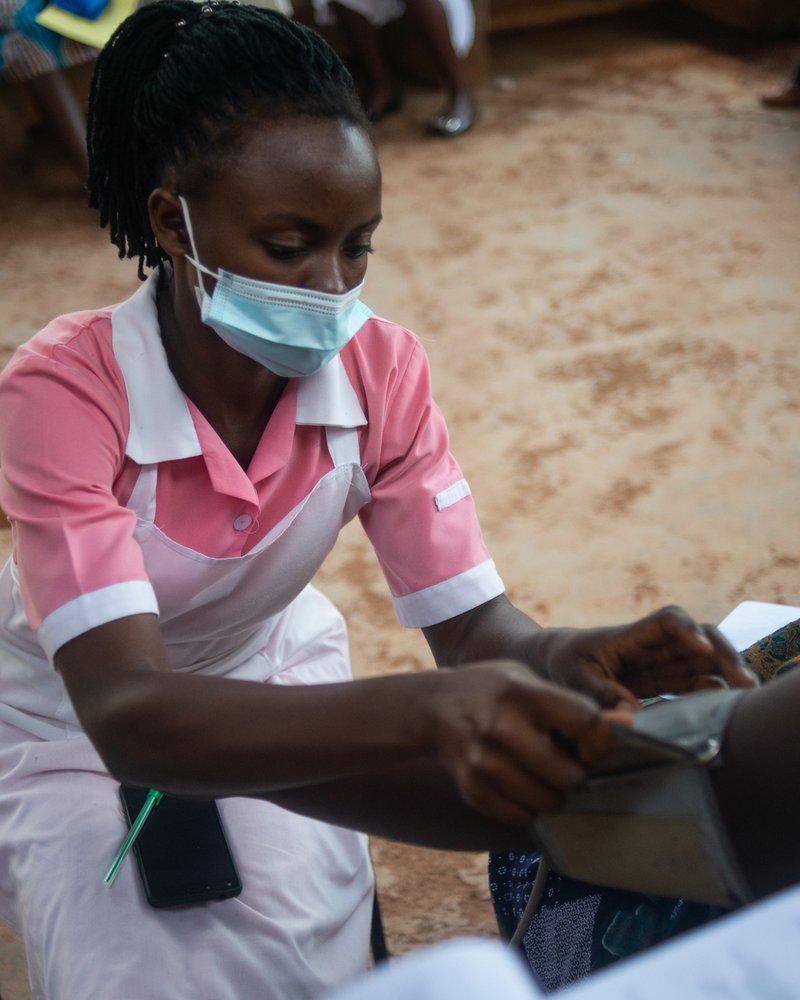
Advocacy Resource Hub
Advocacy is one of the many powerful tools that PATH uses to achieve its mission of health equity. The resources below draw from PATH’s decades of experience conducting advocacy globally and in more than 50 countries.
By working collaboratively with partners to influence the priorities and actions of decision-makers at all levels of the government, PATH helps create lasting policy change that results in better health outcomes for women, children, and families. The tools, case studies, and databases below are meant to help advocates and policymakers learn from and replicate PATH's successes. We encourage you to utilize and disseminate these resources widely. We will continue to update the Resource Hub on a regular basis.
PATH’s 10-part framework for advocacy strategy development
Learn moreAdvocacy capacity strengthening tools
PATH leverages a proven 10-Part Framework for Advocacy Strategy Development to strengthen the capacity of civil society advocates to help them achieve long-term success with their advocacy efforts. PATH’s suite of advocacy capacity strengthening tools has been used through participatory workshops engaging more than 700 individuals in 50 countries. The framework guides our own practice, and our partners have used it to influence health policy change and implementation ranging from funding for immunization, to advancing frameworks for health research and development and product regulation, to influencing national and subnational policies and budgets on maternal, newborn, and child health.
- Workshop curriculum on advocacy strategy development
-
The starting point is our workshop curriculum, a customizable resource to introduce the 10-part advocacy strategy development process. It helps new and experienced advocates assess policy advocacy options, plan goals and activities, and develop a comprehensive strategy for advocacy impact.
The curriculum includes the following resources (available in English and French) which enable advocates and facilitators to build the capacity of their own and other organizations:
- Facilitator’s guide
- Facilitator’s slide set
- Training of facilitators manual
- Workbook for advocates
- Interactive e-learning course
-
To increase the number of advocates who are able to access our capacity strengthening tools, PATH has adapted its workshop curriculum on advocacy strategy development to an online platform. The interactive e-course also allows users the flexibility to pace their learning and fosters a customized learning experience through the support provided in discussion forums.
To access the course, you will need to create an account. From the login screen, select "new account" and follow the steps to create an account and utilize the course.
If you have any difficulty accessing the course please email advocacyandpolicy@path.org.
- Workshop curriculum on strengthening advocacy coalitions
-
One of the most effective tools in advocacy is building and strengthening coalitions representing diverse perspectives. PATH has established several coalitions, strengthened the ability—collectively and individually—of members to advance their policy advocacy goals, and in some cases transitioned management to a local partner or an independent operating structure. To document and help others replicate these successful efforts, we have augmented our curricula to include a facilitator’s guide (available in English and French) and a facilitator’s slide set with a specialized module on strengthening advocacy coalitions.
HIGHLIGHTED RESOURCE
From Capital to Clinic: Tools for Policy Implementation
PATH's Capital to Clinic initiative examines bottlenecks that prevent policies developed at the national level from being implemented at the point of service delivery. Building upon defined strategic frameworks and practitioner know-how, the initiative includes a set of tools to help advocates move the policy process from development to implementation and evaluation.
Guides and toolkits
In addition to the curricula above, PATH has developed specialized guides and toolkits for various health issue areas and advocacy approaches. These resources provide deeper insights to drive advocacy strategies.
- Advocacy resources for immunization in Africa
-
Immunization is a success story for global health and development, saving millions of lives every year at relatively low costs. However, each year, about 20 million infants do not receive the full course of the basic vaccines, with over 50% of them not receiving any vaccines. The following resources were developed by PATH and our partners to support advocacy efforts to increase financing for and access to lifesaving vaccines.
This retrospective study and accompanying country and regional profiles provide evidence on the fluctuating immunization financing trends between 2017 and 2023 across ten African countries.
Building on the findings of our retrospective study, this series of immunization advocacy briefs offers key findings and recommendations and highlights common trends, challenges, and opportunities for expanding access to immunization at the country and regional level.
Co-created with partners across sub-Saharan Africa, this regional advocacy strategy aims to save lives and build a healthier, more resilient Africa by aligning stakeholders around a shared vision: By 2030, ensure strong regional and national leadership that accelerates progress toward immunization targets to reach zero-dose, underimmunized, and missed communities across Africa.
- Advocacy resources for MNCH in Africa
-
Preventable maternal, newborn, and child deaths remain unacceptably high. Scaling up interventions, increasing investments, and strengthening political will can help ensure the 2030 goals related to maternal, newborn, and child health (MNCH) are achieved and mothers and children everywhere can survive and thrive.
Co-created with a group of multisectoral partners and facilitated by PATH, this regional advocacy strategy provides shared plan for MNCH advocacy in Africa that aims to inspire political commitment, mobilize resources and investments in MNCH, align regional voices, and accelerate progress for the women and children living in the communities most impacted by these disparities.
This messaging paper explores five key calls to action to address urgent MNCH advocacy priorities and accelerate progress.
- Advocacy resources for oxygen scale up
-
Oxygen therapy is an essential part of ending preventable deaths among newborns, children, and adults globally.
This primer provides the data, messages, and resources to help understand the planning, policies, and technologies involved in oxygen delivery scale-up. The materials are useful to anyone who wants to learn about scaling up access to oxygen and integrating oxygen delivery across national and subnational policies, programs, and health budgets.
This brief provides an overview of program-based budgeting and associated performance frameworks and advice on choosing oxygen-related indicators to include in program-based budgets.
This guide describes how the Global Financing Facility (GFF) investment case process can be leveraged to increase access to medical oxygen and presents practical approaches and actions that civil society and government can use throughout the GFF process to include medical oxygen.
Oxygen delivery toolkit provides a series of use cases of how countries used the tools to help advocates, implementers, and decision-makers plan, manage, and communicate the value of scaling up oxygen systems and access to pulse oximetry.
Medical oxygen needs tracker is an interactive tool to help advocates, decision-makers, and implementers communicate the importance of investing in access to medical oxygen as a critical component of health systems in low- and middle-income countries.
- Advocacy resources for subcutaneous DMPA
-
Subcutaneous DMPA (DMPA-SC) is an innovative and easy-to-use injectable that is transforming contraceptive access, use, and choice for women and adolescent girls. Advocates have an important role to play in making sure their country’s policies and funding support access to a broad method mix, including new options like DMPA-SC. The following resources were developed by PATH as part of the Injectables Access Collaborative, which is designed to accelerate advocacy efforts. The resources are both in English and French.
The advocacy pack for subcutaneous DMPA consists of evidence-based materials for advocates to use both for their own strategy development and for direct advocacy with decision-makers.
This policy analysis provides a high-level summary of the current state of self-injection policy development, implementation, and monitoring in 11 focus countries: Benin, DRC, Ghana, Kenya, Madagascar, Malawi, Mozambique, Nigeria, Togo, Uganda, and Zambia.
- Advocacy learning labs
-
Even the most experienced advocates and policymakers need the opportunities to talk about the tools and approaches that are most successful in lasting policy change, implementation, and impact. That’s why PATH developed an innovative “learning lab” model to convene stakeholders from multiple countries on emerging topics of high importance to the field of advocacy. These interactive sessions bring together thought leaders from different disciplines to share learning and experience that give rise to “aha moments” and creative approaches or partnerships to solve challenges.
Past learning lab events:
- African Medicines Regulatory Harmonisation training curriculum
-
Prepared by the staff of the African Union Development Agency (AUDA-NEPAD) and PATH, with technical support from the Medicines Policy and Regulatory Reforms Technical committee and other external contributions. This document is meant to be used as a training guide on regulatory systems strengthening in Africa for National Medicines Regulatory Authorities, Regional Economic Communities and all other stakeholders directly or indirectly working in, or able to influence and support regulatory systems at country, regional or continental level.
- Communications toolkit for RSV disease prevention
-
Respiratory syncytial virus (RSV) is a major, under–recognized public health problem causing more severe respiratory infections and hospitalizations in infants and young children each year than any other pathogen. New immunization tools have achieved licensure that could help change that. This toolkit includes a stand-alone RSV primer presentation and fact sheet providing an overview of RSV disease and prevention options. Also available are modular PowerPoint slides that can be mixed and matched with the primer presentation to dive deeper into key topics for informing understanding and decision-making around RSV prevention. All slides come with speaker notes.
We have also compiled a spreadsheet that provides publicly available information on clinical trials of respiratory syncytial virus (RSV) candidate vaccines and monoclonal antibodies intended for prevention.
- Knowledge hub for early childhood development
-
This knowledge hub is both for policymakers and implementers. We share national and subnational health and nutrition policies, strategies, plans, and guidelines that integrate ECD. These are living examples of how relevant content from the Nurturing Care Framework for ECD can be integrated into existing normative documents when dedicated technical assistance is available.
Data resources for advocates
Data can be a powerful tool for informing advocacy efforts to overcome barriers to health equity, but accessibility of data and knowledge of how to use it are key to ensuring that advocacy is rooted in evidence and leads to passage of sound policies and well-informed budgets. These resources aim to collate and make data on key issues more accessible for advocates.
- Africa health R&D commitments tracker
-
This interactive dashboard catalogues information about government and private entity commitments worldwide to improving the end-to-end research and development (R&D) ecosystem in Africa. The tool aims to increase transparency into commitments on manufacturing, clinical trials, and regulatory harmonization, including updates on progress toward meeting the commitments and their impact.
- PHC policy tracker
-
Policies for strong primary health care (PHC) systems are essential to advancing health equity, but they are complex and difficult to design. PATH created the PHC policy tracker as a consolidated source of information to equip policymakers and advocates with information about existing policies that shape PHC systems. The dashboard is designed to provide policymakers, advocates, and donors with data to shape policy dialogues—helping not only to identify strengths and weaknesses of PHC policies in your own country and around the world, but also to learn from others grappling with similar complex policy challenges.
- MNCHN asset tracker
-
PATH’s MNCHN Asset Tracker project provides information on the status of scale-up of key tools and interventions that improve maternal and child health and nutrition outcomes and save lives. The Asset Tracker dashboards allow users to quickly and efficiently compare different indicators across or within countries.
- COVID-19 essential health services policy tracker
-
The COVID-19 EHS Policy Tracker project, which PATH undertook at the height of the COVID-19 pandemic in 2020, aimed to collect, catalogue, visualize, and disseminate government policy responses and other relevant information related to maintaining and adapting essential health services during COVID-19. Even as the acute stage of the pandemic has passed, this tracker remains useful for understanding how countries adapted during the pandemic.
HIGHLIGHTED RESOURCE
Act now: Accelerate progress toward the global MNCH targets
Preventable maternal, newborn, and child deaths remain unacceptably high. After decades of progress, mortality rates have stagnated. In this brief, we explore five key calls to action to address urgent maternal, newborn, and child health (MNCH) advocacy priorities and accelerate progress for sustainable improvements in health for women and children.

PATH plays a supportive or catalytic role, leveraging our technical expertise, convening power, and global networks to strengthen and complement country-led advocacy efforts. Learn more in this brief about how PATH partners with local civil society organizations to transition leadership of advocacy efforts.

Focused, adaptable, and persistent advocacy is the key to scaling innovative health solutions. In their own words, PATH advocates describe how they worked to drive policy change in 2024.

PATH and Kenya’s Ministry of Health launch Kenya’s first oxygen roadmap, setting the stage for equitable access to high-quality, sustainable, and affordable medical oxygen for all Kenyans by 2030.

Since 2002, PATH has partnered with the Government of Uganda to implement impactful projects and programs that promote health equity. Our policy advocacy has been critical in supporting the adoption, implementation and financing of smart policies that advance the realization of universal health coverage in Uganda.

Immunization is one of the most impactful and cost-effective public health interventions available, saving up to 4 million lives every year, according to the World Health Organization (WHO). In addition to its direct impact on the health of populations, immunization brings added value by reducing the burden of disease on individuals, families, and communities.

According to the World Health Organization, medical oxygen is one of the key essential medicines required for multiple health conditions, including asthma, heart failure, and various newborn complications. Over the last decade, the Ugandan government has worked to improve access to medical oxygen. The National Scale Up of Medical Oxygen Implementation Plan (2018–2022), launched in 2019, guided this progress, which included increasing manufacturing capacity and installing oxygen plants at referral hospitals.

Since 2016, PATH has supported the Kakamega County Maternal, Newborn, and Child Health Civil Society Organizations Alliance (MNCH CSO Alliance) to advocate with local policymakers to advance the health of women and children in Kakamega.

Kenya’s Health NGOs Network (HENNET) is a network of over 100 civil society organizations (CSOs) working in health across all 47 counties in Kenya. HENNET coordinates and promotes the engagement of these CSOs to advocate for advancements in health policy.
Read additional case studies here.
We want to hear from you
Do you have feedback on any of these resources? Are there other tools you would find useful?